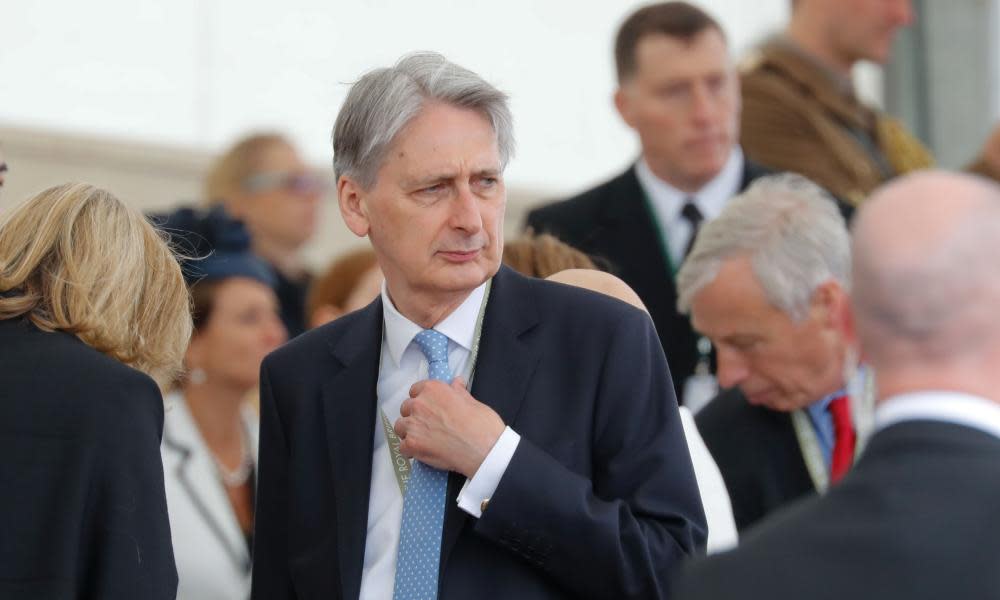Pro-Europe Tories must locate their rebel spirit – and make the case for remain

If hardline Brexiteers were free to shop around for beatable enemies they probably wouldn’t change much about the current state of British politics. Their preferred candidate is well ahead in the final straight of a Tory leadership contest, and his rival doesn’t dare to contradict him on the issue that matters most.
Related: Amber Rudd embraces no-deal Brexit as ministers pitch to Johnson
In hustings on Monday night, Boris Johnson ruled out any Brexit compromise based on revision of the Northern Irish backstop. And that is the only route to a negotiated, orderly resolution visible from Brussels. No backstop; no deal. Jeremy Hunt might have inserted some practical reality into the conversation, if only for the sake of his intellectual credibility, but instead he endorsed the central tenet of Johnsonism: the only Brexit deal worth aiming for is one that doesn’t exist.
It is not news that dignity is soluble in ambition. Hunt, like Matt Hancock and Amber Rudd, has examined the price of a seat at Johnson’s cabinet table and decided he is willing to pay. Others who served under Theresa May, and who understand what leaving the EU in a disreputable huff would cost the country, have made a different choice, preferring integrity on the back benches. The resistance to a no-deal Brexit will soon be bolstered by ministerial veterans – the likes of David Gauke, David Lidington and Philip Hammond.
Even with heavyweight reinforcements, the Tory moderates do not intimidate the zealots. Pro-Europeans in the Commons have been adept in the use of procedural subterfuge against a no-deal Brexit, but that arcane combat does little to advance arguments for alignment with continental allies. One thing it has achieved is Eurosceptic radicalisation, sustaining tales of Westminster conspiracy against national liberation.
Moderate Tories have won skirmishes over the legislative timetable and lost the battle for their party’s soul. One reason is their culture of obedience. The insurgent spirit does not come easily to these natural parliamentary prefects, who sit at the front of the class, waiting to be picked by teacher. The Eurosceptics have the temperament of troublemakers, sitting at the back.

A greater problem still is lack of clarity among pro-European Tories about what they are really fighting for. There is a large number of Brexit Mensheviks – MPs who accept the referendum result but draw a line at the destructive revolutionary fervour of Ukip-style Bolshevism. They voted for May’s withdrawal agreement. They were in favour of “soft” options before the party’s centre of gravity shifted towards the hardliners. Then they ended up taking the view that any deal would be better than no deal. Their candidate in the leadership contest was Rory Stewart, who was lauded for supporting Brexit with body language hinting that he understood it to be a stupid idea. That stance is no longer available. What the Mensheviks call pragmatism, the Bolsheviks call enslavement to Brussels.
There are queasy leavers on the Labour side too – MPs who like nothing about Brexit but would rather go through with it than explain to constituents why it shouldn’t happen. More avowedly pro-European Labour MPs have focused on nudging their reluctant leader towards a second referendum – a strategy that has muddled up means and ends. No one who likes Brexit wants another vote, so the only point of the thing would be to remain, and Jeremy Corbyn struggled to be enthusiastic about that the first time. Inordinate amounts of energy seem to have been wasted trying to persuade a man who doesn’t like the European project to give his party permission to run a campaign in which he would inevitably take a surly back-seat role.
Pro-European voices in the main opposition party have been muted. In the governing party they have been suffocated. That has allowed the Liberal Democrats to emerge as a confidently anti-Brexit party, foil to Nigel Farage’s Brexit party. But that apparent symmetry creates a false equivalence between two polarised positions. The Lib Dems find themselves cast as “ultra-remainers”, as if aborting Brexit is a notion as extreme as Farage’s ambition to burn every bridge to the continent. The fallacy is exposed by imagining the morning after each side gets their way. In the remain scenario, the state functions as before, undisturbed. In the no-deal scenario there is frantic, costly execution of contingency plans and, if they fail, pandemonium.
That is not to deny the political cost of staying in the EU. There would be a heavy penalty in trust among leavers who already feel their democratic will is despised. That price is so high in part because Brexiteers ramp it up, knowing it is their only argument for proceeding with a project that has no economic justifications left. On any technical, legal, financial basis, keeping our current EU deal is by a mile the easiest way out of the mess we are in.
Related: I’ll take you to court to block a no-deal Brexit, Gina Miller tells Boris Johnson
If remaining feels like an extreme measure, that is because even pro-European politicians have been extremely reluctant to admit that it is an available option, let alone make the case. But their other options are running out. The strategy of dilution has failed. The hardliners see no distinction between compromise and betrayal; between efforts to avoid no deal and plots to stop Brexit. That could be liberating for Tory dissenters who feel unable to climb aboard the Johnson bandwagon. They will be cast as remainers anyway, so perhaps they should finally clear their throats and make the case for remain.
• Rafael Behr is a Guardian columnist

 Yahoo News
Yahoo News 
